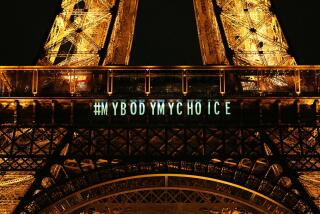Sex, lies and politics -- the French way
Paris — WHEN Nicolas Sarkozy was elected president of France last week, he jumped into a group hug with his family and close supporters. But one key person was absent from the huddle: his wife. Cecilia Sarkozy’s no-show (she did appear at a restaurant a few hours later) was the latest chapter in the president-elect’s marital saga, involving evidence of infidelity on both sides.
Two summers ago, Cecilia took a marital hiatus and was photographed with another man in Paris and New York. A French magazine reported that she left home after receiving an anonymous letter with “dates, names, places” of her husband’s extramarital conquests. Other news outlets said that in Cecilia’s absence, Nicolas — who takes office Wednesday — consoled himself with an attractive reporter from Le Figaro.
According to the American stereotype, this is just another chapter in the French love affair with adultery. In fact, however, ordinary French people are just as keen on fidelity as Americans are. French women say in polls that fidelity is the top quality they seek in a mate, while among men, only a woman’s “tenderness” rates slightly higher.
National sex surveys show that the French are more faithful than Americans during both courtship and marriage: 3.8% of married French men and 2% of women say they’ve had more than one sex partner in the last year, compared with 3.9% of men and 3.1% of women in the U.S. French women are stunned when I tell them about their reputation in the U.S. for looking the other way when their husbands cheat.
When the French do cheat, however, they handle it differently from Americans. The French are apt to think of infidelity as one of the predictable pitfalls of marriage and don’t assume that cheaters should be tossed out of the house. I found in interviews that although Americans insist that “it’s not the sex, it’s the lying,” the French are far less troubled by a few discreet lies to protect a spouse from unpleasant information.
Guilt features heavily in the American adultery script and can lead a cheater to make an uncoerced confession. In France, unfaithful spouses have an easier time reasoning that they’ve made an unfortunate but pragmatic choice. One French husband was perplexed when I asked if he’d gone into therapy to manage the stress of juggling his wife and mistress. About a year into his affair, he had finally left the therapist he’d been seeing for six years. “I solved the problems,” he said. “The problems were marriage and sex.”
One reason Americans misunderstand the French rules is that in France, presidents typically abide by a different standard. The authors of a book called “Sexus Politicus” conclude that Charles de Gaulle was the only postwar French president who was strict about his marriage vows, and that being a “seducer” makes someone seem presidential. Outgoing President Jacques Chirac is known in political circles for the sheer speed of his extramarital trysts (“three minutes, with shower après included,” was the joke his driver repeated in a tell-all). But even French presidents can be hemmed in by public opinion. Francois Mitterrand for years took pains to hide the fact that he had a whole second family, which was off the script even by the standards of French presidents.
Often, French voters aren’t aware of what their leaders are doing behind closed doors. Strict privacy laws and a cozy relationship between politicians and the media scare the French press from saying much about the private lives of politicians. The editor of the weekly Paris-Match was forced to quit after he ran the photos of Cecilia Sarkozy with her boyfriend. Nicolas Sarkozy, who was then interior minister, was furious about the photos, and he is a close friend of the head of the media group that owns Paris-Match. The Sarkozys reconciled soon after their split of 2005, but Cecilia vanished from public view in the lead-up to the May 6 election.
Maybe the French tolerate presidential infidelity more than Americans because of the trickle-down effect of centuries of adulterous monarchs. Whatever the case, when Parisians talk about who their politicians are bedding, it’s not to moralize — the way it might be in the U.S. — but to prove that they’re in the know. When Nicolas Sarkozy boarded a yacht in Malta for some postelection rest, a fashionista in Paris told me she sent frantic text messages to a well-connected friend at another company asking “Who’s on the boat? Who’s on the boat?” Although French editorialists famously sneered at the hubbub about the Clinton-Lewinsky affair, Le Monde rushed to press with a full translation of the Starr report.
The French were quick to understand the script when Cecilia finally appeared late on election night, buffered by a coterie of friends and wearing a decidedly understated gray sweater. Perhaps to make amends for its past transgression, Paris-Match ran a cover photo of her kissing Nicolas on the cheek, next to the headline, “Cecilia shares his victory.” It wasn’t enough to squelch the whispers in Paris.
“Everyone knows that Cecilia is not with him,” one Parisian insider told me. It was a young woman hoping to find a faithful husband.
More to Read
Sign up for Essential California
The most important California stories and recommendations in your inbox every morning.
You may occasionally receive promotional content from the Los Angeles Times.










